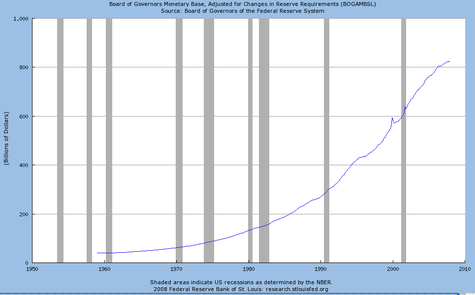Mish s Global Economic Trend Analysis Digging Into Citigroup s Numbers
Post on: 29 Апрель, 2015 No Comment

Digging Into Citigroup’s Numbers
The Wall Street Journal is writing about Citigroup’s $5.1 Billion Loss .
When one Citigroup Inc. unit sneezes, another seems to catch a cold.
The phenomenon was on display Friday, as Citigroup reported that first-quarter profit in its wealth-management division, long considered a crown jewel of the financial empire, fell 33%, dragged down by the poor performances of internal hedge funds that were ravaged by turmoil in the credit markets.
The disappointing showing in the wealth-management business — which includes the Smith Barney retail brokerage and a private bank catering to ultrarich individuals — illustrates a pitfall of Citigroup’s universal bank model, in which a diverse array of businesses are supposed to complement each other and yield superior results. Now, it turns out that ailing units can infect each other as well.
Profits in all four of Citigroup’s main business lines fell sharply from a year ago, and executives warned that the tough times are likely to drag into next year.
Citigroup’s investment bank endured about $12 billion in write-downs on its exposure to various parts of the credit markets, bringing the division’s total losses to about $32 billion since last summer. More hits are possible.
The global consumer group suffered from $6 billion in costs arising from troubled mortgages, home-equity lines, credit cards and auto loans. Losses may extend beyond where we’ve seen historical levels go, said Chief Financial Officer Gary Crittenden. We are in uncharted territory.
And despite stockpiling more than $30 billion in capital in recent months, and repeated assurances from executives that Citigroup has a plethora of capital, Mr. Crittenden said in an interview he couldn’t rule out the possibilities that Citigroup will raise more money or that the board will further cut the firm’s dividend.
In three families of hedge funds, Citigroup this year has either had to inject its own capital to stabilize the funds or barred investors from withdrawing their money. All three fund groups have struggled to stay afloat due to their overexposure to the credit markets.
Losses in those funds infuriated Citigroup brokers, who have been bombarding Ms. Krawcheck and Edward Kelly, the new head of Citigroup’s alternative-investments unit, with angry missives.
Seeking to pacify clients, Ms. Krawcheck and Mr. Kelly have started waiving fees on some funds. The wealth group also set aside $250 million in the first quarter to help clients liquidate their positions in Citigroup’s Falcon fund group, which was burned by big bets on some of the hardest-hit areas of the credit markets. Citigroup’s Earnings Mess
Minyanville’s Mr. Practical weighed in on Citigroup’s Earnings Mess early Friday morning. Let’s take a look.
Citigroups (C) earnings report this morning is a confusing mess. Although bulls loved it, any accountant looking through the numbers would notice right away how much the company’s financial condition continues to deteriorate and how many tricks it can use to hide that fact.
Moodys put them on negative watch and Fitch actually downgraded them.
Take, for example, the headline write-down number of $6 billion. Nice headline, but if you look through all the numbers and add them up the total write-downs are actually $15 billion. And it gets worse.
The company states that revenues included a $1.3 billion gain related to the inclusion of Citis credit spreads in the determination of the market value of those liabilities for which the fair value option was elected. In other words (words which bulls dont like to pay attention to), because the market based price of their bonds fell it reduced the value of their liabilities. So by the fact that their credit became worse they are allowed to show an actual gain to earnings. I know it makes no sense that when a financial companys financial condition worsens they are somehow able to show a gain in earnings because of it, but dont complain to me. Youll have to take it up with Citi’s CFO.
The bottom line is this: The U.S.’ major banks are barely holding on to life itself. Citis financial condition will keep them from making money for a long time even if they do not bust. As speculators pile into the financial stocks again, maybe they should sharpen their pencils a little more.
Citi’s Leverage Grows
Despite a flurry of recent actions to clean up its balance sheet, Citigroup’s (C) leverage continues to rise. Citi’s leverage grew in the fourth quarter of last year to 19:1, up from 18:1 the quarter before. It looks like bean counters in the bowels of the company’s accounting department are still trying to lever the struggling bank out of its problems. Citigroup’s Cathartic Quarter.
Citigroup Inc posted its second straight quarterly loss on Friday, hurt by more than $16 billion of write-downs and costs related to credit losses, and said it will cut another 9,000 jobs.
It’s a cathartic quarter, said Arthur Hogan, chief market analyst at Jefferies & Co in Boston. Vikram Pandit is coming in and making pretty big changes.
Citigroup’s net loss totaled $1.02 per share, and compared with a year-earlier profit of $5.01 billion, or $1.01 per share. Revenue fell 48 percent to $13.22 billion.

The job cuts are in addition to 4,200 announced in the previous quarter. Citigroup said it ended March with about 369,000 employees.
Citigroup has lost close to $15 billion in the last two quarters, and has suffered more than $46 billion in write-downs and increased credit costs since the middle of 2007.
The bank has also slashed its dividend and raised more than $30 billion in capital. It ended March with a Tier-1 capital ratio of 7.7 percent, up from 7.12 percent at year-end, and above the 6 percent that regulators deem well-capitalized. The ratio measures the ability to cover losses.
Book value per share, which measures assets minus liabilities, fell to $20.73 from $22.74 at year end. Return on equity was negative 18.6 percent in the quarter.
Write-downs in the latest quarter included $6 billion tied to subprime mortgages, $3.1 billion for loans to fund corporate buyouts, $1.5 billion for bond insurer exposure, $1.5 billion for auction-rate securities, $1 billion for below-prime Alt-A mortgages, and $600 million for commercial real estate.
The bank also incurred $3.1 billion of additional credit costs related to consumer lending. Market Giddy
The market was giddy Friday, as if the bottom was in. News flash: The bottom is not in. A wave of pay option arms failures, walk aways, commercial real estate writedowns, corporate bankruptcies, and credit card writeoffs is coming. Unemployment is going to soar and an L shaped recession is upon us .
Nonetheless, this bounce was not unexpected. Stocks do not move in a straight line. The markets fell for six straight months so it is not unreasonable to expect a 2-3 month counter trend rally. In terms of price, this rally may be nearly over. In terms of time, another few weeks or longer of choppy waters may be in the cards.
Mike Mish Shedlock
globaleconomicanalysis.blogspot.com
Click Here To Scroll Thru My Recent Post List














